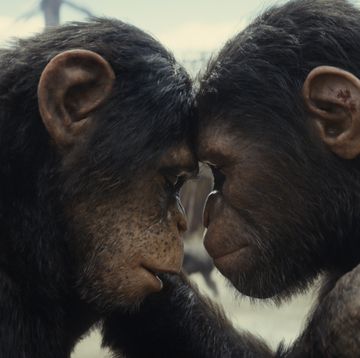Perhaps the strangest part of Don’t Worry Darling is that for all the care director Olivia Wilde took in crafting the film’s nightmarishly pastel wonderland, she couldn’t come up with a single coherent sell for the press tour. It has variously been about female pleasure (“Men don’t come in this film,” Wilde told Variety), a feminist sci-fi and a takedown of conservative hero Jordan Peterson. These, it transpires, were red herrings (of various shades). The film hits some of those marks, but mostly misses. Here’s a better pitch: this is a good old-fashioned action-thriller, big on vibes, low on coherence. And, if you can make peace with that, you'll get along with it just fine.
The film, which is out now in cinemas, is set in Victory, a Californian desert town which is reminiscent of every overly-perfect rendering of American suburbia: it has shades of Desperate Housewives, The Stepford Wives, Instagram accounts dedicated to mid-century furniture. Characters are stripped from a Richard Yates story before their breakdown; perfect wives stay at home all day, cooking, cleaning, drinking martinis, while their husbands head off to a top-secret workplace where they develop “progressive materials”.
At the end of each day, amid perfectly hazy golden hours, the couples reunite over steaks and kitchen-table sex. But Alice (Florence Pugh), married to the anaesthetically sweet Jack (Harry Styles), suspects something is up in Victory. It may not surprise you to know that she is right!
Much has been made of the film’s third-act twist, and it’s not hard to take a ballpark guess at what this could be. It raises many questions, so many questions, probably enough questions to fill another two-hour film. It subverts Don’t Worry Darling’s first two acts (a good thing) but also Wilde’s comments about the entire project (less good).
For that twist to even begin to work however, the film’s world has to be sufficiently well developed. And it is. With cinematographer Matthew Libatique (a regular Darren Aronofsky collaborator), Wilde inventively portrays Victory as a beautiful, sickly haven. At an uneasy pool party hosted by Victory’s mastermind Frank (Chris Pine), easily one of the film’s stand-out scenes, the camera tracks the groups of separate men and women in a figure-of-eight motion. It’s dizzying, compelling, impossible to turn away.
The 1950s era production design from Katie Byron is queasily good; Victory encircles its inhabitants, closes in on Alice as she hopes to break out. Wilde scatters the film with some effective images too: Alice wraps her head in cling film, crushes empty eggs, burns steaks. A sombre love song – co-written by Styles and Pugh, and hummed by the latter throughout the film – doesn’t let us forget the intimate, altogether more sinister truth underpinning the whole thing.
The cast, almost overshadowed by rumoured on-set shenanigans, work overtime to develop the film’s atmosphere. Pugh’s scenes with Wilde, who plays Victory’s head gossip, Bunny, have a spiky, sisterly quality. Their relationship develops satisfyingly until a climax that hints at what Wilde was trying to achieve in all those pre-release interviews.
Other performances are less assured. To call Styles a leading man is erroneous on two accounts. He hasn’t yet proven his ability to take on such a role, and his character is intentionally side-lined for most of the film, though there is at least one dance number where Styles’ electric stage presence is committed to the big screen. Kate Berlant, who plays the eternally pregnant Peg, is the most valuable supporting player, giving the town some depth. She frets about not being invited to parties and her husband’s job, and is a more low-key parallel to Alice.
It’s possible, though not very appealing, to perform all kinds of gymnastics to make the world of Victory make sense: its racial and sexual politics, its geographical and physical machinations, many of its inhabitants’ actions in the final act. The twist will be unforgivably basic and underdeveloped for some. The themes are muddled, the plot holes numerous. Our advice? Forget all that. Don’t Worry Darling isn’t always as interesting as it thinks it is, but it’s definitely as entertaining as it needs to be.
Once – and if – you can accept this, it’s a complete pleasure. Tensions fizzle and crack at a climactic dinner party. Street lamps explode at just the right time. When Alice finds her getaway car – one of the more successfully developed plot points – and heads out across the desert, it’s impossible not to be swept up in Wilde’s vision. Sit back, make a martini, and, darling, don’t think too hard.
'Don’t Worry Darling' is out now in cinemas
Henry Wong is a senior culture writer at Esquire, working across digital and print. He covers film, television, books, and art for the magazine, and also writes profiles.















